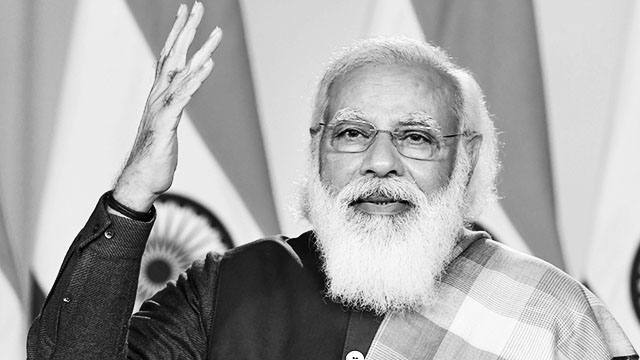
The normalisation of “Hindutva shock therapy” for the consolidation of capitalism in India
The rise of neoliberal marginalisation combined with social and economic marginalisation under a Brahminical structure and its caste-based hierarchical social order has laid the foundation for ‘Hindutva’ political, social, cultural and economic projects. The resurgence of neoliberalism from the 1980s led to the acceleration of further marginalisation of the masses and consolidation of capitalist class’s grip over Indian economy and politics, which led to the rise of Prime Minister Narendra Modi’s brand of Hindutva politics. The political disenchantment, combined with depoliticization, has made India a fertile ground for Hindutva shock therapy to normalise structural exploitation supported by caste-based capitalist order.
The rise of neoliberal markets in India has transformed the diversity of culture of consumption and established the monolithic culture of consumerism. The diversity of consumption was promoting diversity of local production and helping local producers in India which was dismantled with the rise of consumerism. The culture of consumerism disciplines small producer and promotes its monolithic culture of mass production of goods and services. This transformation helps the consolidation of corporates in the production and distribution of goods and services.
This is the foundation of the Modi government’s agricultural reforms. It is shock therapy for both consumers and producers in India. It disciplines both Indian agricultural economy and society in the interests of big multinational corporations and their Indian lackeys.
From demonetisation, roll out of Goods and Services Tax (GST), banking reforms, labour law reforms, citizenship matrix to agricultural reforms are different stages of Hindutva shock therapy to actively destroy established democratic norms and disregard institutional traditions; these are essential processes to reconfigure Indian society to normalise inequality and exploitation. The authoritarian Hindutva shock therapy is a process of lasting structural transformation of Indian society, politics and economy for the deepening capitalism.
The religious attacks on minorities, farmers, students, women, Dalits and tribal and other forms of violent crimes in India today are products of coordinated efforts led by Hindutva forces and their crony capitalists. These shocks are essential components to establish authoritarian control and dominance over the masses.
The Hindutva ideology derives its justification from European fascism and Nazism whereas its economic policies are products of the Washington consensus driven by liberalisation of economy and laws, privatisation of national resources and capitalist globalisation. The idea of minimum government and maximum governance by Modi is a product of such a political, economic ideological praxis.
Modi’s alma mater Rashtriya Swayamsevak Sangh (RSS) and its parliamentary arm Bharatiya Janata Party (BJP) are twin Hindutva organisations, which claimed and propagated economic nationalism in their manifesto in the last five decades but implemented neoliberal projects in the name of economic growth and development. Hypocrisy is the only defining feature of religious, neoliberal and right-wing forces.
The Hindutva anarchy in India today is not an accident for a systematic design to destroy every tenet of democratic culture to establish authoritarian Hindutva capitalism, its state and government apparatus. The Hindutva shock therapy doctrine helps in creating a trust-less, fearful, and subservient society, which is essential for authoritarian politics concomitant with the capitalist economy.
Therefore, the crisis and failure of law and orders are not accidental in India. These are part and parcel of Hindutva ideology, which produces social and economic conflicts and crises to control the masses to pursue the political and economic agendas of the RSS, BJP and the corporations that liberally fill the coffers of these organisations.
In this way, the Hindutva shock therapy is dismantling democracy, dispossessing the masses, and destroying citizenship rights to uphold the interests of capitalism. The dominance and growth of Hindutva are not only about spreading a fraudulent narrative about cultural Hindu nationalism but also about the normalisation of caste and capitalism in India.
The outcomes of Hindutva shock therapy are visible. The major economic indicators are looking gloomy in India. The unemployment and poverty rates are an all-time high. The industrial production is low. Modi’s propaganda has failed to hide declining trade and investment in India. The Modi government has failed miserably and accelerated health crisis led by the coronavirus pandemic. The directionless lockdown has destroyed production, distribution, demand and supply in the Indian economy, but the corporations continue to amass their wealth even during these times of crises.
The Modi government is making capitalism with Hindutva characteristics that serves RSS, BJP and their crony capitalists. Modi and his Hindutva politics are sacrificing India and Indians to save and sustain capitalism in India, where misery for millions and prosperity for few is a norm.
However, the rise of struggles against caste, capitalism and Hindutva by the working class, the farmers, students, and religious minorities in the streets of Delhi and different parts of the country are illuminating new hopes for the restoration of a secular and liberal society and constitutional democracy in India. It is time to celebrate struggles in the streets of India to ensure the defeat Hindutva ideology and Modi government.
Despite all propaganda and state power, fascism, Nazism, and capitalism have failed in human history. The future of Hindutva fascism and capitalism in India will be no different. The failure of Hindutva shock therapy is imminent and let’s accelerate the struggles against it before it further damages the future of India and Indians.
Bhabani Shankar Nayak is a political economist working as Reader in Business Management in the University for the Creative Arts (UCA), UK.
